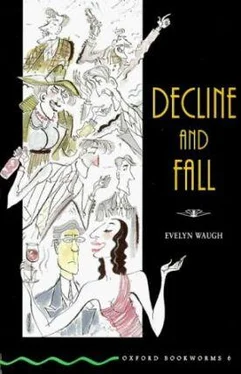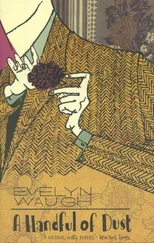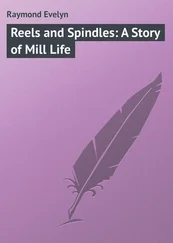No one paid much attention to Paul.
'Here they are, said Dr Fagan. 'This is the statement you are to forward to the Home Secretary, and a duplicate for the Governor of the prison. Shall I read them to you?
' 'Sh'all right! said the surgeon.
'They merely state that you operated on the patient for appendicitis, but that he died under the anaesthetic without regaining consciousness.
'Poor ole chap! said the surgeon. 'Poor, poor l'il girl! And two tears of sympathy welled up in his eyes. 'I daresay the world had been very hard on her. It's a hard world for women.
'That's all right, said Sir Alastair. 'Don't worry. You did all that was humanly possible.
'That's the truth, said the surgeon, 'and I don't care who knows it.
'This is the ordinary certificate of death, said Dr Fagan. 'Will you be so good as to sign it there?
'Oh, death, where is thy sting‑a‑ling‑a‑ling? said the surgeon, and with these words and a laboured effiort of the pen he terminated the legal life of Paul Pennyfeather.
'Splendid! said Sir Alastair. 'Now here's your money. If I were you I should run off and have a drink while the pubs are still open.
'D'you know, I think I will, said the surgeon, and left the sanatorium.
There was a hush for nearly a minute after he had left the room. The presence of death, even in its coldest and most legal form, seemed to cause an air of solemnity. It was broken at length by the arrival of Flossie, splendidly attired in magenta and green.
'Why, here you all are! she said with genuine delight. 'And Mr Pennyfeather, too, to be sure! Quite a little party!
She had said the right thing. The word 'party' seemed to strike a responsive note in Dr Fagan.
'Let us go down to supper, he said. 'I'm sure we all have a great deal to be thankful for.
* * *
After supper Dr Fagan made a little speech. 'I think this an important evening for most of us, he said, 'most of all for my dear friend and sometime colleague Paul Pennyfeather, in whose death to‑night we are all to some extent participants. For myself as well as for him it is the beginning of a new phase of life. Frankly, this nursing-home has not been a success. A time must come to every man when he begins to doubt his vocation. You may think me almost an old man, but I do not feel too old to start lightheartedly on a new manner of life. This evening's events have made this possible for me. I think, he said, glancing at his daughters, 'that it is time I was alone. But this is not the hour to review the plans of my future. When you get to my age, if you have been at all observant of the people you have met and the accidents which have happened to you, you cannot help being struck with an amazing cohesiveness of events. How promiscuously we who are here this evening have been thrown together! How enduring and endearing the memories that from now onwards will unite us! I think we should drink a toast ‑ to Fortune, a much‑maligned lady.
Once before Paul had drunk the same toast. This time there was no calamity. They drank silently, and Alastair rose from the table.
'It's time Paul and I were going, he said.
They walked down to the beach together. A boat was waiting for them.
'That's Margot's yacht, said Alastair. 'It's to take you to her house at Corfu until you've decided about things. Good‑bye. Good luck!
'Aren't you coming any farther? asked Paul.
'No, I've got to drive back to King's Thursday. Margot will be anxious to know how things have gone off.
Paul got into the boat and was rowed away. Sir Alastair, like Sir Bedivere, watched him out of sight.
Three weeks later Paul sat on the veranda of Margot's villa, with his evening apéritif before him, watching the sunset on the Albanian hills across the water change, with the crude brilliance of a German picture‑postcard, from green to violet. He looked at his watch, which had that morning arrived from England. It was half‑past six.
Below him in the harbour a ship had come in from Greece and was unloading her cargo. The little boats hung round her like flies, plying their trade of olive‑wood souvenirs and forged francs. There were two hours before dinner. Paul rose and descended the arcaded street into the square, drawing his scarf tight about his throat; the evenings began to get cold about this time. It was odd being dead. That morning Margot had sent him a bunch of Press cuttings about himself, most of them headed 'Wedding Sensation Echo' or 'Death of Society Bridegroom Convict'. With them were his tie‑pin and the rest of his possessions which had been sent to her from Egdon. He felt the need of the bustle at the cafés and the quayside to convince him fully of his existence. He stopped at a stall and bought some Turkish delight. It was odd being dead.
Suddenly he was aware of a familiar figure approaching him across the square.
'Hullo! said Paul.
'Hullol' said Otto Silenus. He was carrying on his shoulder a shapeless knapsack of canvas.
'Why don't you give that to one of the boys? They'll take it for a few drachmas.
'I have no money. Will you pay him?
'Yes
'All right! Then that will be best. I suppose you are staying with Margot?
'I'm staying at her house. She's in England.
'That's a pity. I hoped I should find her here. Still I will stay for a little, I think. Will there be room for me?
'I suppose so. I'm all alone here.
'I have changed my mind. I think, after all, I will marry Margot.
'I'm afraid it's too late.
'Too late?
'Yes, she married someone else.
'I never thought of that. Oh well, it doesn't matter really. Whom did she marry? That sensible Maltravers?
'Yes, he's changed his name now. He's called Viscount Metroland.
'What a funny name!
They walked up the hill together. 'I've just been to Greece to see the buildings there, said Professor Silenus.
'Did you like them?
'They are unspeakably ugly. But there were some nice goats. I thought they sent you to prison.
'Yes, they did, but I got out.
'Yes, you must have, I suppose. Wasn't it nice?
'Not terribly.
'Funny! I thought it would suit you so well. You never can tell with people, can you, what's going to suit them?
Margot's servants did not seem surprised at the arrival of another guest.
'I think I shall stay here a long time, said Professor Silenus after dinner. 'I have no money left. Are you going soon?
'Yes, I'm going back to Oxford again to learn theology.
'That will be a good thing. You used not to have a moustache, used you? he asked after a time.
'No, said Paul. 'I'm just growing one now. I don't want people to recognize me when I go back to England.
'I think it's uglier, said Professor Silenus. 'Well, I must go to bed.
'Have you slept any better lately?
'Twice since I saw you. It's about my average. Good night.
Ten minutes later he came back on to the terrace, wearing silk pyjamas and a tattered old canvas dressing-gown.
'Can you lend me a nail file? he asked.
'There's one on my dressing‑table.
'Thank you. But he did not go. Instead he walked to the parapet and leant out, looking across the sea. 'It's a good thing for you to be a clergyman, he said at last. 'People get ideas about a thing they call life. It sets them all wrong. I think it's poets that are responsible chiefly. Shall I tell you about life?
'Yes, do, said Paul politely.
'Well, it's like the big wheel at Luna Park. Havc you seen the big wheel?
'No, I'm afraid not.
'You pay five francs and go into a room with tiers of seats all round, and in the centre the floor is made of a great disc of polished wood that revolves quickly. At first you sit down and watch the others. They are all trying to sit in the wheel, and they keep getting flung off, and that makes them laugh, and you laugh too. It's great fun.
Читать дальше












